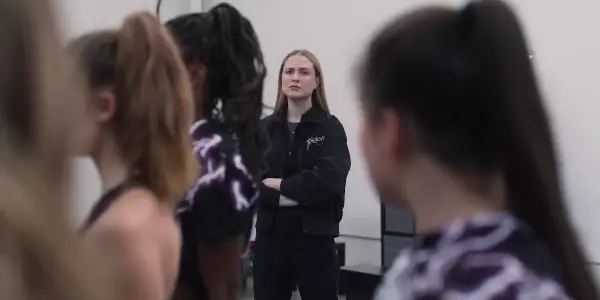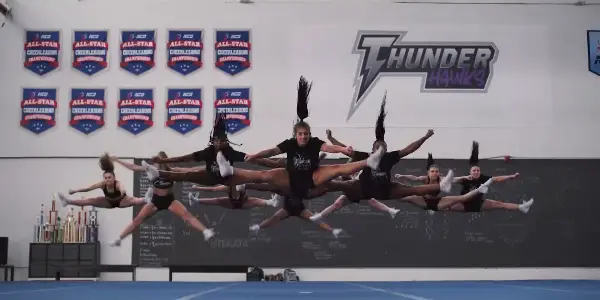BACKSPOT: Panic Attacks And Full Splits

Film critic, Ithaca College and University of St Andrews graduate,…
About once a year, there’s a movie or TV show about cheerleaders in which they a) don’t have sex, b) aren’t leered at by football quarterbacks, and c) don’t get ax-murdered. Backspot is one such movie. Some ax-murdering would’ve moved things along, don’t get me wrong, but Backspot is a queer coming-of-age story of determination, anxiety, obsession, and forgiveness, so a serial killer might’ve dampened the mood.
Reservation Dogs star Devery Jacobs plays Riley, an ambitious cheerleader who would kill a man without hesitation if it guaranteed her a place in the Thunderhawks, a professional cheer squad presided over by the stern perfectionist Eileen McNamara (Evan Rachel Wood). Many critics and viewers have compared Backspot to Whiplash, because of the complex mentor-student relationship, the main character’s at-times-reckless drive to succeed, and the butthole-clenching stress of it all. But Backspot has some crucial stuff that Whiplash doesn’t: It’s executive-produced by Elliot Page, it’s the feature directorial debut of nonbinary Canadian badass DJ D.W. Waterson, and it’s got a scene where Riley and her girlfriend, Amanda (Kudakwashe Rutendo), belt Legally Blonde: The Musical in the car.
Blood, Sweat, And Vomit
When a few spots open on the Thunderhawks, Riley, Amanda, and their cheer friend Rachel (Noa DiBerto) climb aboard. Eileen is an empathetic but no-nonsense coach who rules the Thunderhawks with an eagle stare and an iron fist alongside her no. 2, Devon (Thomas Antony Olajide). The drama at first tracks Riley, Amanda, and Rachel’s journey into the ranks of the team as Riley scores the distinguished backspot position. But the team’s intensity and Riley’s inability to cope with it starts fraying her relationship with Amanda. Riley anxiously plucks her eyebrows and restlessly shakes her leg on a normal day, and being on the Thunderhawks only kicks these habits into hyperdrive.

Like a kiss and a slap across the face, Backspot both captures the joy and innocence of being young and in love and, minutes later, shows the blood, sweat, and vomit of competitive cheer. Waterson, who also wrote the story that supports Joanne Sarazen’s screenplay, understands the stress of competitive sports and how they take and take and take. The biggest coup Backspot pulls compared to other dramas about obsession and sports is how the abusive relationship at its core is not between the athlete and the coach — it’s between the athlete and the sport itself.
Here Be Dragons
The supporting cast all brings their A-game. DiBerto is an extremely talented performer, bringing authentic Gen Alpha charisma and bubbles to every scene she’s in. Olajide quietly dominates from the sidelines until he’s surprisingly at the front and center of the drama, glittery and paternal and covered in sweat. As Riley’s enthusiastic, sometimes cheesy mom, Tracy, Shannyn Sossamon is wonderful. Quiet scenes between her and Jacobs over dinner are heartbreaking because of their authenticity. She’s unfortunately not in Backspot much — however, like that cheer position, she might be in the back, but the whole pyramid falls down without her support. The film intentionally keeps Tracy in the background much of the time, and the drama between her and Riley mostly emerges in Riley’s relationship with her coach. (Coach Eileen at one point rightly calls out Riley for this proxy-mother business, asking if she’d expect the same from her if she were a male coach.) Some messy relationships between coaches and athletes, Backspot seems to hypothesize, are projections of strained relationships between athletes and their parents.

When it comes to Coach Eileen, Wood plays the coach like a dragon — although the film gradually reveals her to be a toothless one. The coach proves to be a red herring, a necessary but ultimately supplemental element of a story otherwise interested in Riley’s interiority and her drive to succeed in cheer. Wood is terrific. Backspot never allows her to capital-A Act the same way Whiplash allows J.K. Simmons, but Backspot’s naturalistic writing, more internalized performances, and low-stakes drama also make Whiplash feel like a cartoon by comparison. Besides, the coach is never the film’s focus — and neither is the cheer, frankly. The film even defangs its own cheer performance climax in favor of a cathartic reunion between lovers.
Reject Heterosexuality, Embrace Cheer
I don’t have the experience of growing up queer in Toronto, Canada. But I’m sure Waterson knows what they’re talking about. Backspot is abundant in expression of experience, and its performances show a keen attention to painting the specifics of this queer coming-of-age story. Jacobs in particular is so fucking good in this. She nails the demanding physical requirements of the role, doing jump-splits and cartwheels and landing tucks while staying completely in character, capping off routines with a steely but shaky resolve.
I’ve made Backspot sound as though it’s all about the characters and the performances, but cinematographer James Poremba does some interesting stuff here, too. The film opens with a POV GoPro gymnastics routine, forcing us into the perspective of the lead character and making us see the world through her eyes. In the multitude of cheer sequences, the handheld camera barely keeps up with the performers as they jump, tuck, kick, and twist across the mats. In keeping with the film’s focus on internal drama, the camera rarely pulls back from the characters. The widest shots we see outside of the gymnastics sequences are medium shots (from the waist to the top of the head), and Poremba and Waterson love their dramatic closeups. It’s almost to the point of overuse. The film is photographed in a fly-on-the-wall faux-documentary handheld style, likely a symptom of a low budget meshed with a director’s vision for a grounded, relatable, authentic story. As a result, the film has a consistent look, feel, and rhythm, but there’s nothing engaging, thematic, or unique about the compositions. Backspot is efficiently shot but moves by in a blur — it’s a good thing the characters are worth watching.
Backspot’s value as a work of art lies in its finely tuned characters and definitive insight on Riley’s queer experience. The cheer portion of the film, while core to Backspot, never feels like it gets the attention that the characters do. Similarly, the screenplay — like many cheer stories before it — fails to address why these characters are drawn to cheer in the first place. (Tangentially, that Netflix documentary series America’s Sweethearts: Dallas Cowboy Cheerleaders goes on for five hours, and we never once learn why any of those women want to be cheerleaders, either.) Backspot is at least open to critiques of cheer and cheerleaders, but in 2024, I’d have hoped that cheer films as a subgenre would’ve evolved enough to be able to foster that dialogue more. All we get is lip service. Instead, Backspot settles for being quietly novel, gently new.

Cheer films aren’t really known for queer characters; instead, they’re usually aggressively hetero and lean hard into gender stereotypes. Up until maybe the 2010s, cheer films were largely sold as voyeuristic experiences — that’s what makes killer cheerleader films like Jennifer’s Body so radical, the art reclaims the female body as a deadly weapon or a vessel of supernatural possession rather than an instrument of sexuality or a battleground for the masturbatory fantasies of teenagers.
It is admittedly unfair to penalize Backspot for not reinventing the wheel — it’s enough that this is an honest, insightful, patient drama about a queer woman in cheerleading. I wish it was more than that — I wish the film tried to convince me why cheer matters, what it means for Riley, and whether the sport specifically appeals to or makes room for queer people. But that’d be wishing for a different movie, and one of the key morals of queer storytelling is to accept people as they are.
Conclusion: Backspot
I was on board with Backspot as soon as Riley and Amanda sang Legally Blonde: The Musical in the car at the tops of their lungs. Their love is believable, their struggles feel real, and Waterson directs it all with tenderness and attention to detail. Waterson strikes me as an actors’ director, someone more finely attuned to interiority and performance than big set pieces. I can’t wait to see what they work on next.
Backspot released in U.S. theaters May 31, 2024.
Does content like this matter to you?
Become a Member and support film journalism. Unlock access to all of Film Inquiry`s great articles. Join a community of like-minded readers who are passionate about cinema - get access to our private members Network, give back to independent filmmakers, and more.
Film critic, Ithaca College and University of St Andrews graduate, head of the "Paddington 2" fan club.













